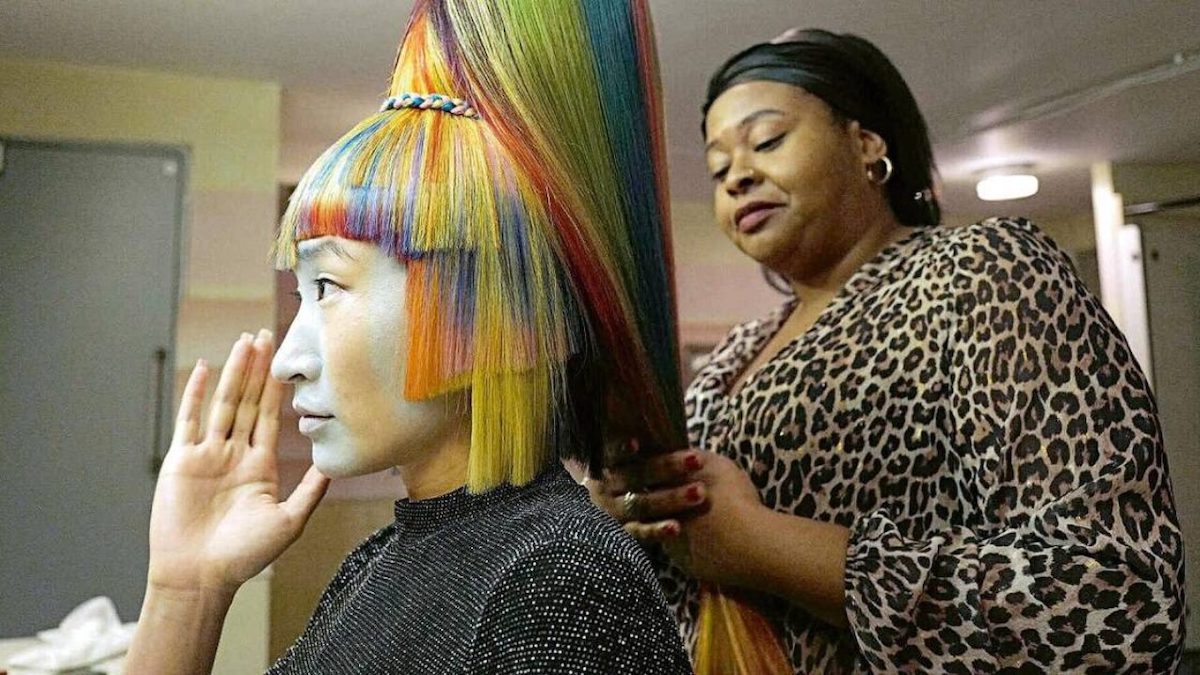This Director Haunted Salons for Months for His Hair-Themed Whodunnit

For director Thomas Hardiman, making a film like Medusa Deluxe involved plenty of hands-on research. “I was the weird guy sitting in the back of hair salons in London for months,” he says, laughing. “I did my research because I wanted this to be an inclusive film. Everyone’s got hair, everyone goes to the hairdresser at some point in their lives. I wanted it to be a film that was reflective of a lot of different people’s life experience.”
Medusa Deluxe, which premiered at the Locarno Festival in 2022 and comes out in theaters this week, begins in the aftermath of a murder. Someone has been scalped at a regional hairdressing competition, and as the police inspect the crime scene, the stylists and models backstage whisper, bicker, and find unlikely enlightenment in their art. The personalities in Medusa Deluxe are big; the hair itself is spectacular. We sat down with Hardiman shortly before the film’s wide release.
Medusa Deluxe unfolds in a fractured, serpentine style, with characters moving through the bowels of a theater’s dressing rooms and hallways as they reveal bits and pieces of the story. Hardiman says that his filmmaking style has a wide range of influences, from the Irish raconteurs in his family to the fiction of Donald Barthelme.
“I love the way that Barthelme throws collage stories together,” Hardiman says. “He wrote a book called Snow White, which is an erotic retelling of Snow White and also an absurdist comedy, and I remember reading it and thinking, I didn’t know you could do that. I didn’t know you could take a famous story and twist it on its head. I feel like that kind of storytelling hasn’t made its way into cinema. It’s rare that you can have collage filmmaking that can still tell a story, and I find that pretty exciting.”
Medusa Deluxe also has strong undercurrents of divinity running through it, with Greek myth, American southern gospel, and folk superstition all creeping into the story. “My mum is from an Irish Catholic family, so religion is important to her,” Hardiman says. “I’m interested in how people interact with spirituality. Religion’s an important aspect of life, so I was thinking about how to sew that into a character.”
Of course, the Medusa myth itself plays a central role in the film. “I think it’s a clearly misogynistic myth,” Hardiman says. “I would have thought that Medusa was this incredible, headstrong woman who probably just removes herself from a male-dominated society and gets ostracized. And over the course of centuries, she becomes a monster in the same way that people become witches, become othered. I wanted to reinterpret the myth, and turn it on its head.”
Of course, the hairstyles themselves are a clear highlight of the film, filled with cascades of rainbows, glittery sculptural creations, and props that glow in the dark. “I begged [hair stylist] Eugene Souleiman to be part of this film,” Hardiman says. “For me, he’s the greatest hairdresser in the world. The film itself is about artifice and tearing things apart, and that’s what he does in his hairdressing. He comes from this punk culture of the 70s, and even though I don’t come from a punk background, the mentality is similar to where I’m coming from creatively, so we’ve got a kind of kinship there.”
Hardiman says that Souleiman produced creations that blew him away. “The first time I saw the fountain of hair, I thought, that’s going to be great. The second time I saw it, it had grown a foot. The third time I saw it, it had grown two or three feet, and I thought, yeah, we’re onto something now.”
But every hairstyle is in service of the story. “Eugene wanted to be a method hairdresser, and wanted to inhabit the characters as he made the styles,” Hardiman says. “the hairstyles reflect the characters who made them, so you can see ambition in one. You can see nastiness in another. It’s about storytelling and character.”
This interview was edited for length and clarity.
(featured image: A24)
Have a tip we should know? tips@themarysue.com